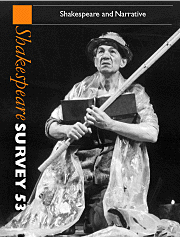Book contents
- Frontmatter
- Shakespeare’s Narremes
- Stepping Out of Narrative Line: A Bit of Word, and Horse, Play in Venus and Adonis
- A ‘consummation devoutly to be wished’: The Erotics of Narration in Venus and Adonis
- Echoes Inhabit a Garden: The Narratives of Romeo and Juliet
- A Midsummer Night’s Dream: Comedy as Apotrope of Myth
- Plutarch, Insurrection, and Dearth in Coriolanus
- Shakespeare, Crossing the Rubicon
- Vernacular Criticism and the Scenes Shakespeare Never Wrote
- The Shadow of Lear’s ‘Houseless’ in Dickens
- Shakespearian Margins in George Eliot’s ‘working-day world’
- In Her Father’s Library: Margaret Fuller and the Making of the American Miranda
- The Magician in Love
- Narrative Approaches to Shakespeare: Active Storytelling in Schools
- Monsters, Magicians, Movies: The Tempest and the Final Frontier
- Shakespeare’s Self-Repetitions and King John
- Inside Othello
- The View of London from the North and the Playhouses in Holywell
- Measured Endings: How Productions from 1720 to 1929 Close Shakespeare’s Open Silences in Measure for Measure
- Shakespearian Utopias
- Shakespeare Performances in England, 1999
- Professional Shakespeare Productions in the British Isles January–December 1998
- The Year's Contributions to Shakespearian Study 1 Critical Studies
- 2 Shakespeare’s Life, Times, and Stage
- 3 Editions and Textual Studies
- Books Received
- Index
Inside Othello
Published online by Cambridge University Press: 28 March 2007
- Frontmatter
- Shakespeare’s Narremes
- Stepping Out of Narrative Line: A Bit of Word, and Horse, Play in Venus and Adonis
- A ‘consummation devoutly to be wished’: The Erotics of Narration in Venus and Adonis
- Echoes Inhabit a Garden: The Narratives of Romeo and Juliet
- A Midsummer Night’s Dream: Comedy as Apotrope of Myth
- Plutarch, Insurrection, and Dearth in Coriolanus
- Shakespeare, Crossing the Rubicon
- Vernacular Criticism and the Scenes Shakespeare Never Wrote
- The Shadow of Lear’s ‘Houseless’ in Dickens
- Shakespearian Margins in George Eliot’s ‘working-day world’
- In Her Father’s Library: Margaret Fuller and the Making of the American Miranda
- The Magician in Love
- Narrative Approaches to Shakespeare: Active Storytelling in Schools
- Monsters, Magicians, Movies: The Tempest and the Final Frontier
- Shakespeare’s Self-Repetitions and King John
- Inside Othello
- The View of London from the North and the Playhouses in Holywell
- Measured Endings: How Productions from 1720 to 1929 Close Shakespeare’s Open Silences in Measure for Measure
- Shakespearian Utopias
- Shakespeare Performances in England, 1999
- Professional Shakespeare Productions in the British Isles January–December 1998
- The Year's Contributions to Shakespearian Study 1 Critical Studies
- 2 Shakespeare’s Life, Times, and Stage
- 3 Editions and Textual Studies
- Books Received
- Index
Summary
All Shakespeare’s major tragedies but one take their source from true or mythical history, whether British or classical or European. To the Elizabethan mind, not yet as relativistic about history as ourselves, this plainly invested tragedy with a special privilege, a depth and reach, a stability as of truth itself. Othello is the exception; it takes its story from fiction only. Cinthio’s narrative of a jealous Moor in Venice, a man trapped in sexual intrigue, necessarily bequeaths to the play a yarn urban and realistic in its hard knowingness, its concise brutality, its final lack of the metaphysical. Jealousy, the very centre of the story, is nothing if not a function of love as possession and possessiveness. That Shakespeare was aware of these limiting pressures is clear from the brilliance of his evocation, in two plays, of Venice as the greatest trading-centre of Europe, its riches both extreme and vulnerable. All the many readers who have seen in Othello what Bradley once called its lack of universality, seen the problem of meaning in this tragedy of love-trade, are surely seeing in the play Cinthio’s source: tragedy as mere narrative.
- Type
- Chapter
- Information
- Shakespeare SurveyAn Annual Survey of Shakespeare Studies and Production, pp. 184 - 195Publisher: Cambridge University PressPrint publication year: 2000



